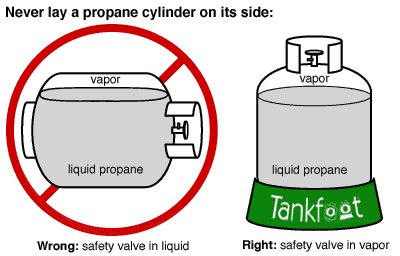Good propane safety info here.
 http://pioneerrentalsinc.com/propanesafety.htm
http://pioneerrentalsinc.com/propanesafety.htmHere are some propane safety guidelines
Propane has a broad range of applications, from barbecue grills to alternative-fuel vehicles. When handled correctly, it is a safe, convenient energy source. However, being a flammable gas, it can be dangerous if not handled properly. In order to protect yourself, your family and others, you need to be aware of the everyday hazards around you. Propane is no exception.
•Never use or inspect a propane cylinder indoors.
•Check your propane cylinder for leaks before you fire up the grill. Discharge of propane can create a flammable environment.
•To check your propane cylinder for leaks, apply a solution of soapy water to valves and connections. A leak will cause bubbles to form.
•The distinct odor of rotten eggs is an indicator of a propane leak. Remove any source of flame from the area, determine the source of the leak and repair or replace any defective parts.
•Any any cylinder over 12 years old must be re-certified before it can be filled.
•If you have a new grill or a new propane tank, before filling, remember all new cylinders must be purged of the inert gas before filling.
•Always store and transport a propane cylinder in an upright position.
•Never store a propane cylinder in a garage, basement or shed. Heat may cause the pressure relief valve to open and release propane.
•In storage or in transit, always secure your propane cylinder in an upright position. Secure it in this position to avoid shifting or tipping.
•Be aware of regulations regarding safe transportation of propane cylinders. It is illegal to transport propane cylinders in the trunk of a car.
•When having your cylinder serviced make sure your supplier employs trained, certified personnel to refill propane cylinders.
•Always keep cylinder secured in an upright position with cylinder valve turned off.
•Do not transport cylinder in an unvented space or anywhere it could be exposed to high temperatures.
•Do not leave a propane cylinder inside a closed/parked vehicle. The heat buildup inside the vehicle will cause the gas to expand and set off the relief valve releasing flammable propane.
